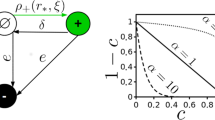Abstract
Since despotism is a common evolutionary development in human history, we seek to understand the conditions under which it can originate, persist, and affect population trajectories. We describe a general system of population ecology equations representing the Ideal Free and Despotic Distributions for one and two habitats, one of which contains a despotic class that controls the distribution of resources. Using analytical and numerical solutions we derive the optimal concession strategy by despots with and without subordinate migration to an alternative habitat. We show that low concessions exponentially increase the time it takes for the despotic habitat to fill, and we discuss the trade-offs despots and subordinates confront at various levels of exploitation. Contrary to previous hypotheses, higher levels of despotism do not necessarily cause faster migration to alternative habitats. We further show how, during colonization, divergent population trajectories may arise if despotic systems experience Allee-type economies of scale.





Similar content being viewed by others
References
Allen, R. C. (1997). Agriculture and the origins of the state in anciet Egypt. Explorations in Economic History, 34, 135–154.
Allen, J., & O’Connell, J. F. (2008). Getting from Sunda to Sahul. In G. A. Clark, F. Leach, & S. O’Connor (Eds.), Islands of inquiry: Colonisation, seafaring and the archaeology of maritime landscapes (pp. 31–46). Canberra: Australian National University Press.
Buston, P. M., & Zink, A. G. (2009). Reproductive skew and the evolution of conflict resolution: a synthesis of transactional and tug-of-war models. Behavioral Ecology, 20(3), 672–684. doi:10.1093/beheco/arp050.
Carneiro, R. L. (1970). A theory of the origin of the state: traditional theories of state origins are considered and rejected in favor of a new ecological hypothesis. Science, 169(3947), 733–738.
Domar, E. D. (1970). The causes of slavery or serfdom: a hypothesis. The Journal of Economic History, 30(1), 135–154.
Fretwell, S. D., & Lucas, H. L. (1970). On territorial behaviour and other factors influencing habitat distribution in birds. I. Theoretical development. Acta Biotheoretica, 19, 16–36.
Hakoyama, H., & Iguchi, K. (2001). Transition from a random to an ideal free to an ideal despotic distribution: the effect of individual difference in growth. Journal of Ethology, 19(2), 129–137.
Johnson, A. W., & Earle, T. K. (2000). The evolution of human societies: from foraging group to agrarian state (2nd ed.). Palo Alto: Stanford University Press.
Kennett, D. J., & Winterhalder, B. (2008). Demographic expansion, despotism, and the colonisation of East and South Polynesia. In G. Clark, F. Leach, & S. O’Connor (Eds.), Islands of inquiry: Colonisation, seafaring and the archaeology of maritime landscapes (pp. 87–96). Canberra: Australia National University Press.
Kennett, D., Anderson, A., & Winterhalder, B. (2006). The ideal free distribution, food production and the colonization of Oceania. In D. Kennett & B. Winterhalder (Eds.), Behavioral ecology and the transition to agriculture. Berkeley: University of California Press.
Kennett, D. J., Winterhalder, B., Bartruff, J., & Erlandson, J. M. (2009). An ecological model for the emergence of institutionalized social hierarchies on California’s Northern Channel islands. In S. Shennan (Ed.), Pattern and process in cultural evolution (pp. 297–314). Berkeley: University of California Press.
Matlab (Version 6.5.1924 Release 13). (2002). The MathWorks.
Shennan, S. (2008). Population processes and their consequences in early Neolithic central Europe. In J-P. Bocquet-Appel & O. Bar-Yosef (Eds.), The neolithic demographic transition and its consequences (pp. 315–329). Netherlands: Springer.
Steward, J. (1949). Cultural causality and law: a trial formulation of the development of early civilizations. American Anthropologist, 51(1), 1–27.
Summers, K. (2005). The evolutionary ecology of despotism. Evolution and Human Behavior, 26, 106–135.
Trigger, B. G. (2003). Understanding early civilizations: A comparative study. Cambridge: Cambridge University Press.
Winterhalder, B., Kennett, D. J., Grote, M. N., & Bartruff, J. (2010). Ideal free settlement of California’s Northern Channel Islands. Journal of Anthropological Archaeology, 29, 469–490.
Wittfogel, K. A. (1957). Oriental despotism: A comparative study of total power. New Haven: Yale University Press.
Zimmerman, G. S., LaHaye, W. S., & Gutierrez, R. J. (2003). Empirical support for a despotic distribution in a California spotted owl population. Behavioral Ecology, 14(3), 433–437. doi:10.1093/beheco/14.3.433.
Acknowledgments
This article is UC Davis Contribution #1 to the collaborative research project Development and Resilience of Complex Socioeconomic Systems: A Theoretical Model and Case Study from the Maya Lowlands, supported by the National Science Foundation, Division of Behavioral and Cognitive Sciences (HSD #0827275). The manuscript was improved by comments from Peter Richerson, Mark Grote, Richard McElreath, Sam Bowles, Rob Boyd, Monique Borgerhoff Mulder, and James O’Connell.
Author information
Authors and Affiliations
Corresponding author
Rights and permissions
About this article
Cite this article
Bell, A.V., Winterhalder, B. The Population Ecology of Despotism. Hum Nat 25, 121–135 (2014). https://doi.org/10.1007/s12110-014-9190-7
Published:
Issue Date:
DOI: https://doi.org/10.1007/s12110-014-9190-7




